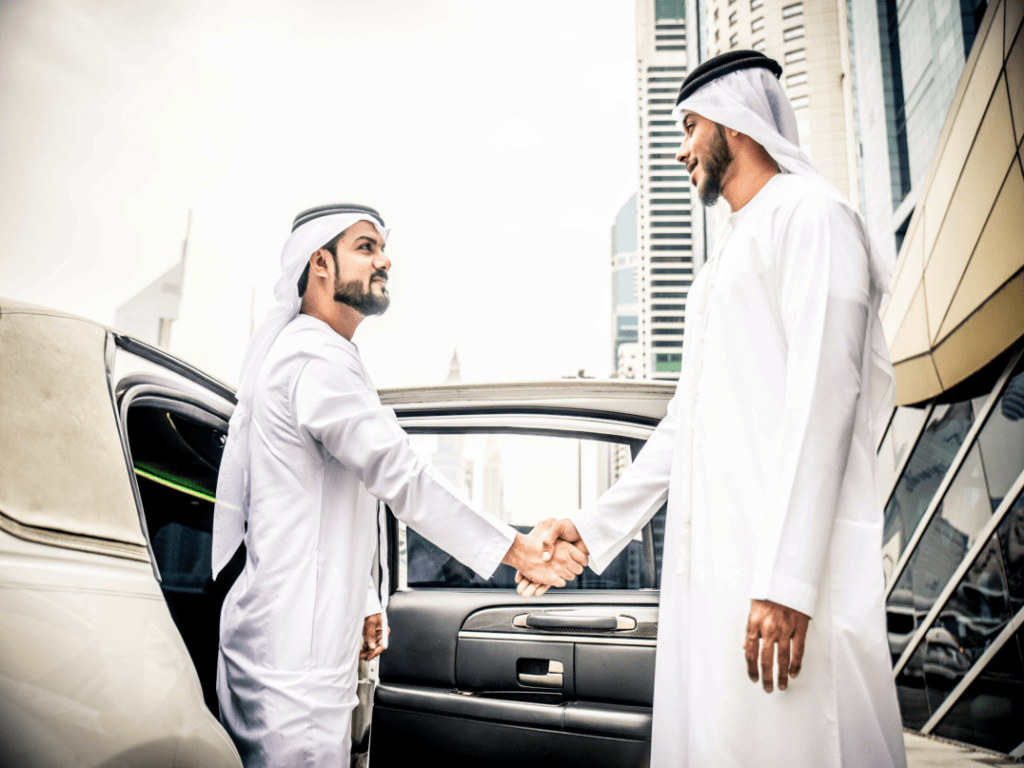Dubai is a stunning city that welcomes people from all over the world. While it is incredibly diverse and modern, it’s also located in the United Arab Emirates, a country with deep-rooted traditions and Islamic values. To have a wonderful and respectful experience, understanding cultural etiquette Dubai is essential. This guide will help you navigate the unspoken rules and traditions, from greetings to festivals.
Cultural Etiquette Dubai: General Social Etiquette and Greetings
The way you interact with people can create a strong positive impression.
- Greetings and Handshakes: A simple handshake is common, but wait for an Emirati or Gulf national of the opposite sex to offer their hand first. A hand-to-the-heart gesture is a common and respectful alternative. Among older Emirati men, a gentle “nose kiss” is a traditional form of greeting, though it’s not expected from foreigners. The right hand is also considered more respectful for handshakes and giving/receiving objects.
- Be a Respectful Guest When Visiting an Emirati Home: If you’re invited to an Emirati home, it’s a great honor. When entering, remove your shoes and accept the food or coffee you’re offered. It’s considered rude to refuse. Guests are often welcomed into the majlis , a special room for receiving guests and holding conversations. When you have had enough Arabic coffee (gahwa), you should gently shake your small cup (finjan) to signal you are finished.
- Learn These Useful Phrases in Arabic: Learning a few basic phrases goes a long way in showing respect. Start with these:
- As-salamu alaykum (السلام عليكم) – The universal greeting, meaning “Peace be upon you.”
- Shukran jazeelan (شكراً جزيلاً) – “Thank you very much.”
- Afwan (عفواً) – “You’re welcome.”
- Baraka Allahu feek (بارك الله فيك) – “May God bless you.”
- Body Language in UAE: Remember that close proximity during conversations is normal. It’s also considered an insult to point the soles of your feet at someone or to use your left hand for giving or receiving things, as the right hand is considered clean. Direct pointing with your finger is also a taboo.
Etiquette Rules to Follow in Dubai
There are a few important rules to be aware of to ensure your visit is smooth and respectful.
- Dressing Etiquette: Dress modestly in public places. While swimwear is fine for beaches and pools, it’s best to cover your shoulders and knees in public areas, especially malls and government offices. For men, this means avoiding sleeveless shirts. Women visiting a mosque must cover their hair, arms, and legs.
- Public Displays of Affection Are Prohibited: Holding hands with your spouse is acceptable, but kissing and other public displays of affection are not. They are strictly prohibited and can lead to serious trouble. This rule is especially important for unmarried couples.
- Don’t Drink Alcohol or Exhibit Disruptive Drunken Behavior in Public Places: Alcohol is only served in licensed venues like hotels and clubs. Drinking or acting drunk in public is illegal and can have serious consequences. Even being drunk in a public space can be an offense.
- Swearing and Offensive Gestures Can Land You in Trouble: Using profane language or making offensive gestures in public is considered a serious offense. This includes gestures made while driving or in online conversations. Even a thumbs-up gesture can have a different, negative meaning in some contexts.
- Avoid Conversations Around Controversial Topics: The UAE is a stable country, and it’s best to avoid discussing topics that might be considered controversial, such as criticizing the ruling family, local politics, or religious beliefs.
Dining Etiquette
Meals in Dubai are a social affair, and showing proper etiquette is a sign of respect.
- Use Your Right Hand: Always use your right hand for eating, drinking, and passing food. The left hand is considered unclean in Arab culture, so it’s a taboo to use it for these actions.
- Wait for Your Host: Don’t start eating until your host or the most senior person at the table begins. This is a sign of respect and patience.
- Accept Hospitality: If you’re a guest, it’s polite to accept food and drink when offered. Your host may insist that you eat more, as it is a way of showing generosity, and it’s polite to accept at least a little more.
- Sharing Mezze: Sharing Mezze is a common custom where a variety of small dishes—like hummus and tabbouleh—are placed in the center of the table for everyone to share. This act of sharing food is a powerful symbol of unity and community.
Religious and Cultural Sensitivities
Respect for religion and tradition is a cornerstone of life in Dubai.
- Religious Sensitivities: Most of Dubai’s residents are Muslim, and respect for Islam is fundamental. During the holy month of Ramadan, it is prohibited to eat, drink, or smoke in public during daylight hours. At night, families gather for iftar, the breaking of the fast, in a festive atmosphere.
- Traditional Customs and Religious Festivals: The two main Eid celebrations are Eid al-Fitr (after Ramadan) and Eid al-Adha (the Feast of Sacrifice). These are times of family, community, and special meals. It is a sign of respect to acknowledge these celebrations. The Hajj pilgrimage to Mecca is also a major event for Muslims worldwide.
- The Family: In the UAE, The Family is the core of society. Arabic family traditions value loyalty and respect for elders. Family is often extended to include a wider clan, and decisions are often made with the entire family in mind.
- Uae language and Culture: While the official language is Arabic, English is widely spoken, especially in Dubai. However, learning a few Arabic phrases is a thoughtful gesture and will be greatly appreciated by locals.
Conclusion
By keeping these customs in mind, you can fully enjoy your visit to Dubai while showing respect for its rich culture and people. To connect on an even deeper level and learn the uae language, consider using a dedicated app like the Kaleela app.




